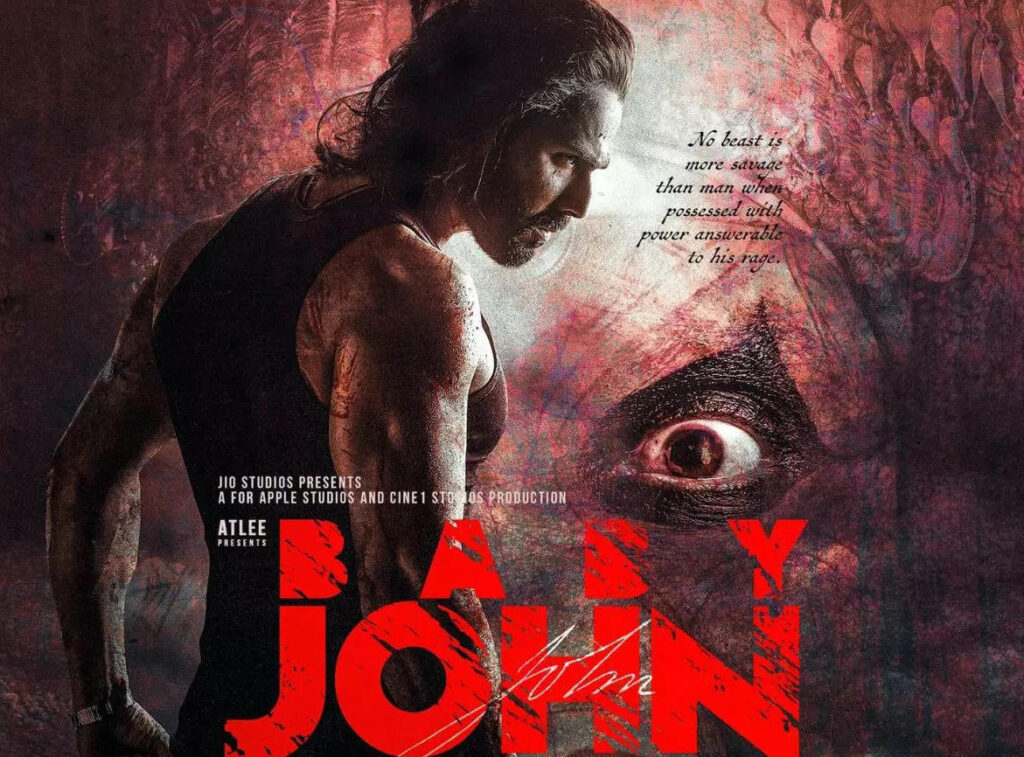Baby John, a remake of Atlee’s Theri (2016) and directed by Kalees, features an all-too-predictable storyline and an over-reliance on clichés and formulaic tropes. The over-the-top heroics and implausible scenarios are all too familiar, causing our interest in the film to wear off quickly. This, besides having us question whether this remake was even necessary in the first place.
John is a single father who lives a peaceful life with his daughter, Khushi (Zara Zyanna), in Alappuzha, Kerala, running a bakery. Tara (Wamiqa Gabbi), Khushi’s teacher, develops a soft spot for John. A scuffle with a member of a sex trafficking gang sees John tap into the ‘action-hero’ within him. We learn about his past as DCP Satya Verma, a fierce policeman. As Satya, he led a happy married life with his wife, Meera (Keerthy Suresh), their newborn daughter Khushi, and his mother (Sheeba Chaddha). However, when Satya clashes with a goon, Nanaji (Jackie Shroff), the latter kills Meera and his mother. Shattered and wanting to get away from it all, John, for the sake of his baby daughter, begins living a new and anonymous life in Kerala. But now, with his identity revealed, Nanaji comes after John again…
Baby John begins with a police raid in a warehouse run by a gang of sex traffickers and ends with a showdown in a shipyard. Apart from these sequences, the film is mostly a copy-paste of scenes and situations from Theri. Theri was designed as a star vehicle to leverage the appeal of a demi-god-like mass hero, Vijay. However, Varun Dhawan, who attempts to tread a similar path, falters with his ordinary performance, unable to carry off the role of the larger-than-life action hero. And though Dhawan attempts to inject some zing into his performance, he lacks the charisma and screen presence of Vijay. The cameo by one of Bollywood’s biggest heroes as ‘Agent Bhaijaan’ in the film’s climax further highlights how Dhawan has struggled to carry Baby John on his shoulders alone. As a result, we are left with little to root for the protagonist.
While Theri was not a gold standard of realism, the world it depicted was still somewhat relatable. In contrast, in Baby John, everything from John and Khushi’s house to the police stations appears overly opulent. Furthermore, the characters’ speech and behaviour often make us feel like we are watching a South Indian film dubbed in Hindi. The message – that vigilante justice, in the form of extrajudicial killings, is sometimes effective – has been done to death by now. The excessive use of macro shots, slow-motion striding, and the tossing of the veshti feel passé. What Baby John lacks most is a more focused narrative and a tighter screenplay. The writing is lazy, to say the least. Making Tara an undercover cop adds nothing to the story beyond being an unnecessary red herring, while the songs suffer from poor placement – two of them occur in the film with a gap of just five minutes between them.
Of the cast apart from Dhawan, Keerthy Suresh, as Meera, does what she can within the constraints of her character. Wamiqa Gabbi, as Tara, brings an engaging presence to her role, but Jackie Shroff, as Nanji, is disappointingly one-dimensional, resembling a stereotypical cardboard villain straight out of a 1990s film. Rajpal Yadav skillfully balances the film’s comedic and dramatic moments genuinely. Sheeba Chaddha, Zakir Hussain, Prakash Belawadi, and Shrikant Yadav are wasted in inconsequential and caricatured roles.
The cinematography by Kiran Koushik captures the action sequence stylishly, and his framing of the characters tries to bring some dynamic flair to the otherwise listless film. Antony Ruben edits the film with a pace that is so fast-paced to try and make us forget the film’s flaws. But at 159 minutes, it’s still an exhausting watch. S Thaman’s loud background score overwhelms Resul Pookutty’s sound design, which consequently appears limited to just adding the foley sounds of bullets, blows, and, of course, crunching bones. The action sequences are characterized by excessive violence and a focus on gratuitous bloodshed.
While at one end, Indian films such as All We Imagine As Light (2024) garner international recognition at prestigious platforms like the Cannes Film Festival or the Golden Globes, films like Baby John drag us back to a more medieval age of storytelling while treating the audience with a condescending lack of intelligence. The sooner such banal storytelling comes to an end in Hindi mainstream cinema, the better.
Hindi, Action, Drama, Color


